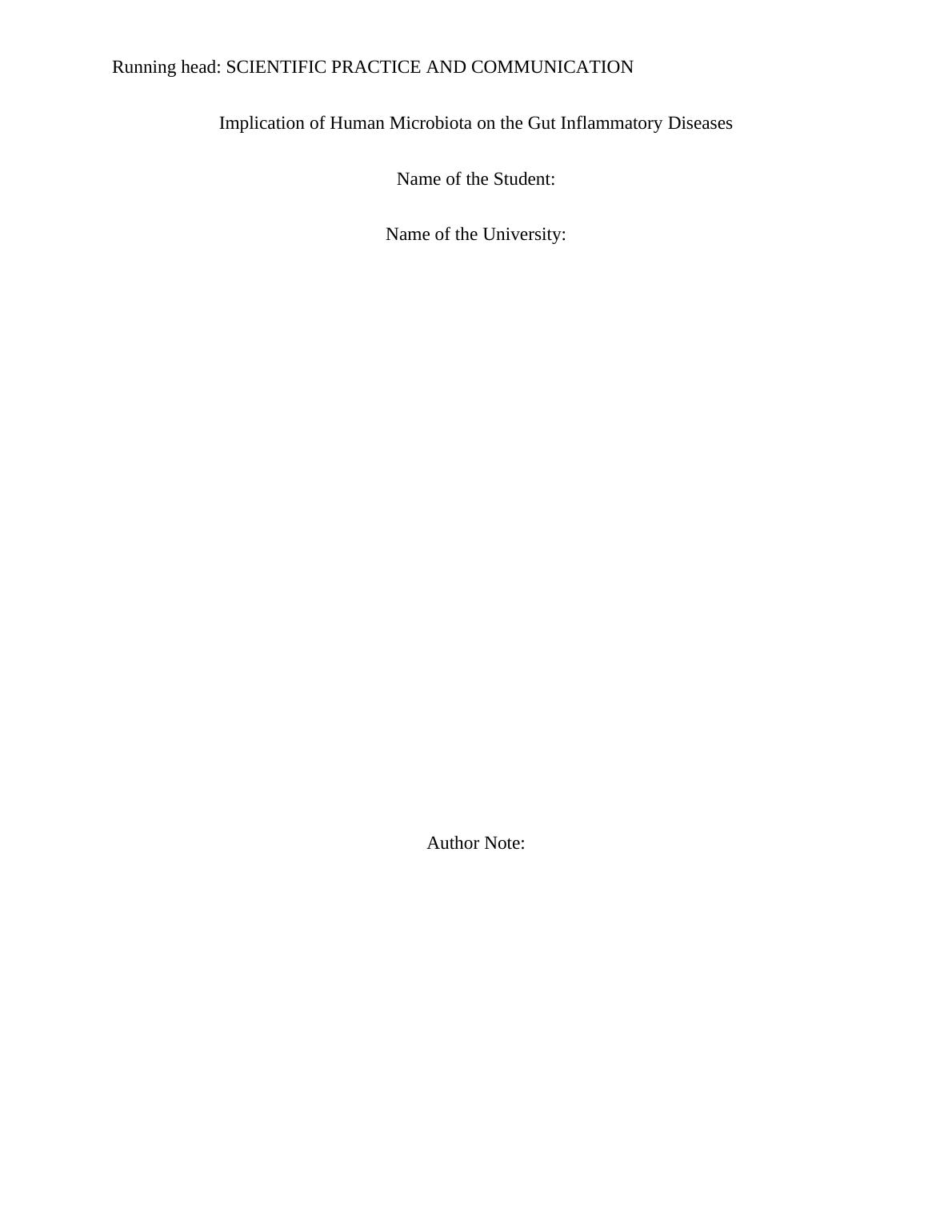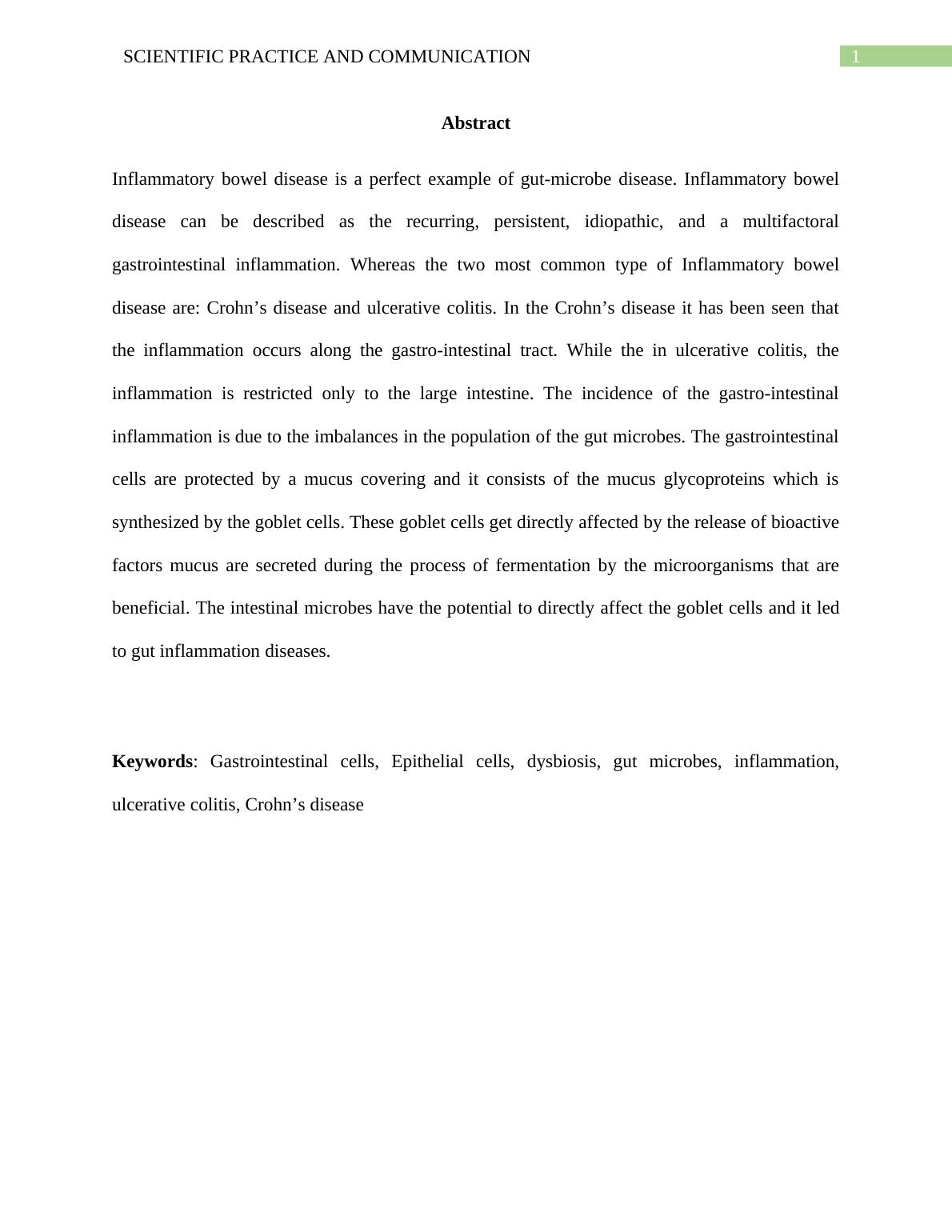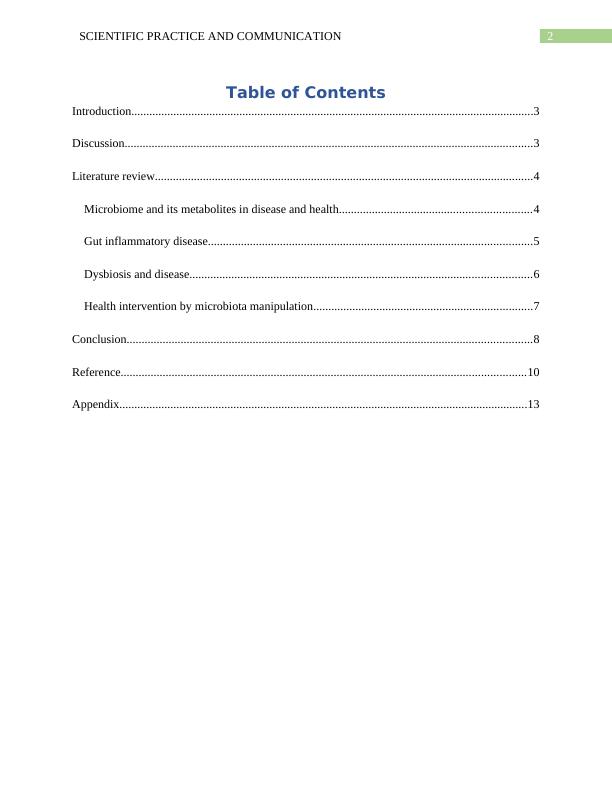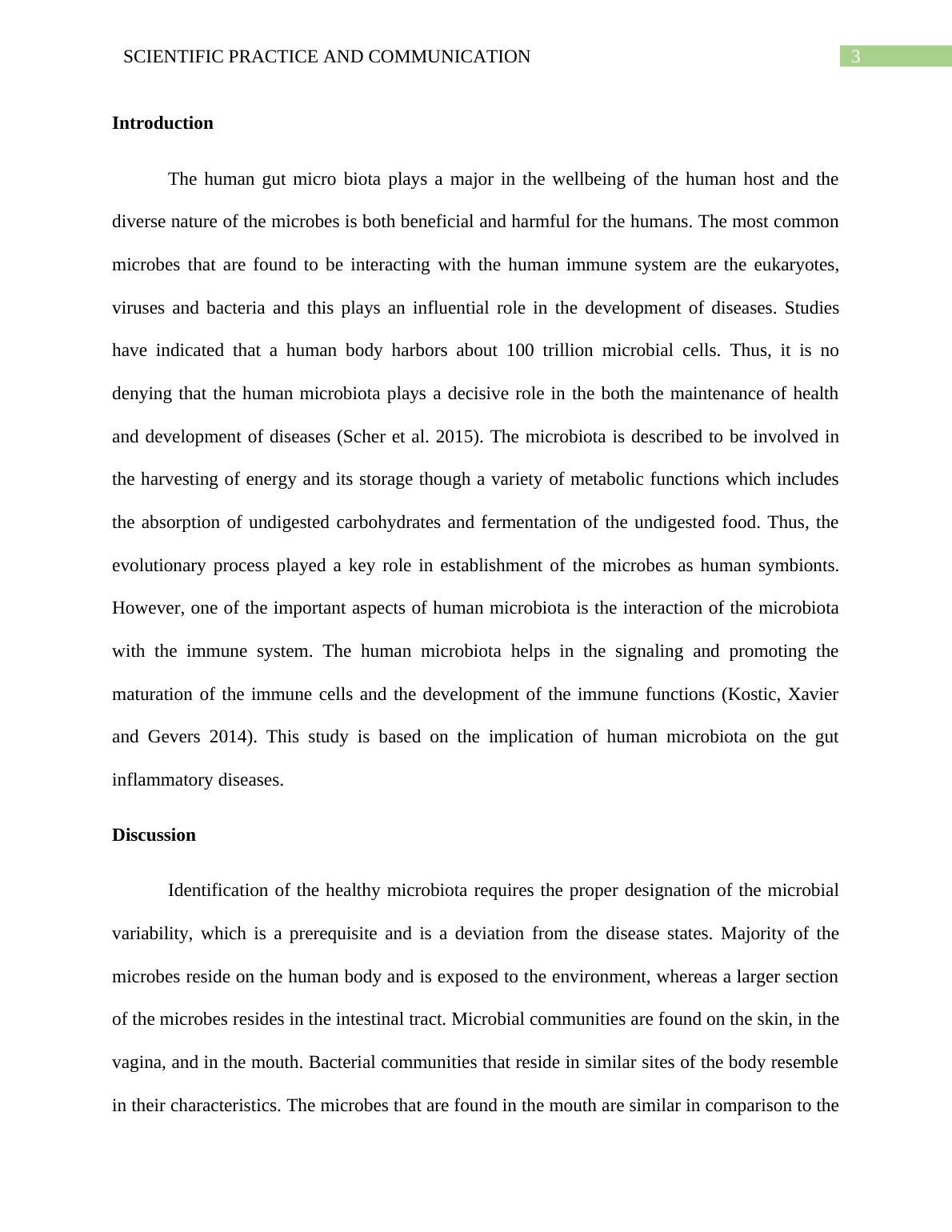Implication of Human Microbiota on the Gut Inflammatory Diseases
Added on 2023-06-04
15 Pages3260 Words483 Views
Running head: SCIENTIFIC PRACTICE AND COMMUNICATION
Implication of Human Microbiota on the Gut Inflammatory Diseases
Name of the Student:
Name of the University:
Author Note:
Implication of Human Microbiota on the Gut Inflammatory Diseases
Name of the Student:
Name of the University:
Author Note:

1SCIENTIFIC PRACTICE AND COMMUNICATION
Abstract
Inflammatory bowel disease is a perfect example of gut-microbe disease. Inflammatory bowel
disease can be described as the recurring, persistent, idiopathic, and a multifactoral
gastrointestinal inflammation. Whereas the two most common type of Inflammatory bowel
disease are: Crohn’s disease and ulcerative colitis. In the Crohn’s disease it has been seen that
the inflammation occurs along the gastro-intestinal tract. While the in ulcerative colitis, the
inflammation is restricted only to the large intestine. The incidence of the gastro-intestinal
inflammation is due to the imbalances in the population of the gut microbes. The gastrointestinal
cells are protected by a mucus covering and it consists of the mucus glycoproteins which is
synthesized by the goblet cells. These goblet cells get directly affected by the release of bioactive
factors mucus are secreted during the process of fermentation by the microorganisms that are
beneficial. The intestinal microbes have the potential to directly affect the goblet cells and it led
to gut inflammation diseases.
Keywords: Gastrointestinal cells, Epithelial cells, dysbiosis, gut microbes, inflammation,
ulcerative colitis, Crohn’s disease
Abstract
Inflammatory bowel disease is a perfect example of gut-microbe disease. Inflammatory bowel
disease can be described as the recurring, persistent, idiopathic, and a multifactoral
gastrointestinal inflammation. Whereas the two most common type of Inflammatory bowel
disease are: Crohn’s disease and ulcerative colitis. In the Crohn’s disease it has been seen that
the inflammation occurs along the gastro-intestinal tract. While the in ulcerative colitis, the
inflammation is restricted only to the large intestine. The incidence of the gastro-intestinal
inflammation is due to the imbalances in the population of the gut microbes. The gastrointestinal
cells are protected by a mucus covering and it consists of the mucus glycoproteins which is
synthesized by the goblet cells. These goblet cells get directly affected by the release of bioactive
factors mucus are secreted during the process of fermentation by the microorganisms that are
beneficial. The intestinal microbes have the potential to directly affect the goblet cells and it led
to gut inflammation diseases.
Keywords: Gastrointestinal cells, Epithelial cells, dysbiosis, gut microbes, inflammation,
ulcerative colitis, Crohn’s disease

2SCIENTIFIC PRACTICE AND COMMUNICATION
Table of Contents
Introduction......................................................................................................................................3
Discussion........................................................................................................................................3
Literature review..............................................................................................................................4
Microbiome and its metabolites in disease and health................................................................4
Gut inflammatory disease............................................................................................................5
Dysbiosis and disease..................................................................................................................6
Health intervention by microbiota manipulation.........................................................................7
Conclusion.......................................................................................................................................8
Reference.......................................................................................................................................10
Appendix........................................................................................................................................13
Table of Contents
Introduction......................................................................................................................................3
Discussion........................................................................................................................................3
Literature review..............................................................................................................................4
Microbiome and its metabolites in disease and health................................................................4
Gut inflammatory disease............................................................................................................5
Dysbiosis and disease..................................................................................................................6
Health intervention by microbiota manipulation.........................................................................7
Conclusion.......................................................................................................................................8
Reference.......................................................................................................................................10
Appendix........................................................................................................................................13

3SCIENTIFIC PRACTICE AND COMMUNICATION
Introduction
The human gut micro biota plays a major in the wellbeing of the human host and the
diverse nature of the microbes is both beneficial and harmful for the humans. The most common
microbes that are found to be interacting with the human immune system are the eukaryotes,
viruses and bacteria and this plays an influential role in the development of diseases. Studies
have indicated that a human body harbors about 100 trillion microbial cells. Thus, it is no
denying that the human microbiota plays a decisive role in the both the maintenance of health
and development of diseases (Scher et al. 2015). The microbiota is described to be involved in
the harvesting of energy and its storage though a variety of metabolic functions which includes
the absorption of undigested carbohydrates and fermentation of the undigested food. Thus, the
evolutionary process played a key role in establishment of the microbes as human symbionts.
However, one of the important aspects of human microbiota is the interaction of the microbiota
with the immune system. The human microbiota helps in the signaling and promoting the
maturation of the immune cells and the development of the immune functions (Kostic, Xavier
and Gevers 2014). This study is based on the implication of human microbiota on the gut
inflammatory diseases.
Discussion
Identification of the healthy microbiota requires the proper designation of the microbial
variability, which is a prerequisite and is a deviation from the disease states. Majority of the
microbes reside on the human body and is exposed to the environment, whereas a larger section
of the microbes resides in the intestinal tract. Microbial communities are found on the skin, in the
vagina, and in the mouth. Bacterial communities that reside in similar sites of the body resemble
in their characteristics. The microbes that are found in the mouth are similar in comparison to the
Introduction
The human gut micro biota plays a major in the wellbeing of the human host and the
diverse nature of the microbes is both beneficial and harmful for the humans. The most common
microbes that are found to be interacting with the human immune system are the eukaryotes,
viruses and bacteria and this plays an influential role in the development of diseases. Studies
have indicated that a human body harbors about 100 trillion microbial cells. Thus, it is no
denying that the human microbiota plays a decisive role in the both the maintenance of health
and development of diseases (Scher et al. 2015). The microbiota is described to be involved in
the harvesting of energy and its storage though a variety of metabolic functions which includes
the absorption of undigested carbohydrates and fermentation of the undigested food. Thus, the
evolutionary process played a key role in establishment of the microbes as human symbionts.
However, one of the important aspects of human microbiota is the interaction of the microbiota
with the immune system. The human microbiota helps in the signaling and promoting the
maturation of the immune cells and the development of the immune functions (Kostic, Xavier
and Gevers 2014). This study is based on the implication of human microbiota on the gut
inflammatory diseases.
Discussion
Identification of the healthy microbiota requires the proper designation of the microbial
variability, which is a prerequisite and is a deviation from the disease states. Majority of the
microbes reside on the human body and is exposed to the environment, whereas a larger section
of the microbes resides in the intestinal tract. Microbial communities are found on the skin, in the
vagina, and in the mouth. Bacterial communities that reside in similar sites of the body resemble
in their characteristics. The microbes that are found in the mouth are similar in comparison to the

End of preview
Want to access all the pages? Upload your documents or become a member.
Related Documents
Diets and Intestinal Health : Assignmentlg...
|5
|1132
|244
Effect of Antibiotics on the Mucosal Immune System.lg...
|4
|1115
|23
The Impact of Diet and Lifestyle on Gut Microbiota and Human Healthlg...
|28
|18639
|305
Perioperative Nursing (complete)lg...
|4
|835
|70
Crohn’s Disease: Etiology, Incidence, Precipitating Factors, Complications, Prognosis, Iatrogenic, Sequalaelg...
|7
|1740
|51
Health Variation: Ulcerative Colitis Case Studylg...
|7
|1524
|109
